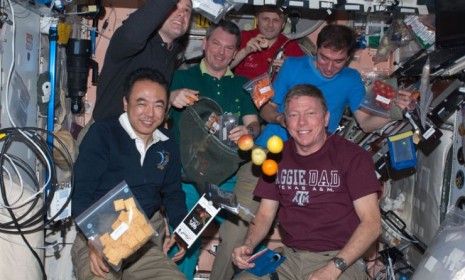Why do astronauts crave spicy food?
The fiery kick of Tabasco is a persistent favorite among space explorers, and Earth-bound food engineers are determined to find out why

A free daily email with the biggest news stories of the day – and the best features from TheWeek.com
You are now subscribed
Your newsletter sign-up was successful
Zero-gravity does a lot of weird things to the human body. It even makes astronauts suspended in space crave foods they wouldn't necessarily find themselves snacking on here on Earth — particularly hot sauce. What is it, exactly, that causes space explorers to salivate over Tabasco? Here, a brief guide:
Astronauts crave hot sauce?
They do. In one memorable example aboard the International Space Station in 2002, the fate of the visiting crew of the space shuttle Atlantis briefly hinged on the fiery condiment. Astronaut Peggy Whitson demanded that the Atlantis crew pony up a resupply of the red stuff before granting them entry to her space station. She was joking... but still.
The Week
Escape your echo chamber. Get the facts behind the news, plus analysis from multiple perspectives.

Sign up for The Week's Free Newsletters
From our morning news briefing to a weekly Good News Newsletter, get the best of The Week delivered directly to your inbox.
From our morning news briefing to a weekly Good News Newsletter, get the best of The Week delivered directly to your inbox.
What other things foods do astronauts desire?
"They crave [spicy] peppers, they crave sour and sweet things," says Jean Hunter, a food engineer at Cornell University who is studying astronauts' appetites. They also dig the nasal kick of horseradish, Wasabi, strong coffee, and Thai chile-garlic paste.
Why?
It's likely because of the stuffy noses caused by zero gravity. When floating in space, the body's fluids gather in the head. (On Earth, fluids are dragged downward by gravity.) This upward mobility of bodily fluids ends up giving astronauts more circular, cartoonish-looking faces. "We call it Charlie Brown phase," says Michele Perchonok of NASA's food science program, "because their faces have gotten more round." Astronauts confirm that zero gravity "can spur cold-like symptoms."
A free daily email with the biggest news stories of the day – and the best features from TheWeek.com
And spicy foods penetrate stuffy noses?
Hot sauce certainly helps astronauts clear up their congestion. And remember, when your sense of smell is blocked, your sense of taste is dampened, too. So the spicier your food, the more likely you are to actually taste it.
Are scientists studying this?
Yes. Hunter has been charged with testing this theory here on Earth over the next few months. Volunteers will spend weeks in a specially modified bed to position their heads lower than their feet, thus recreating the Charlie Brown effect. This, by the way, says Sarah Zhang at Discover, "might not be what people had in mind when they volunteered for astronaut simulations."
Sources: Discover, Knovel, NPR, Scientific American